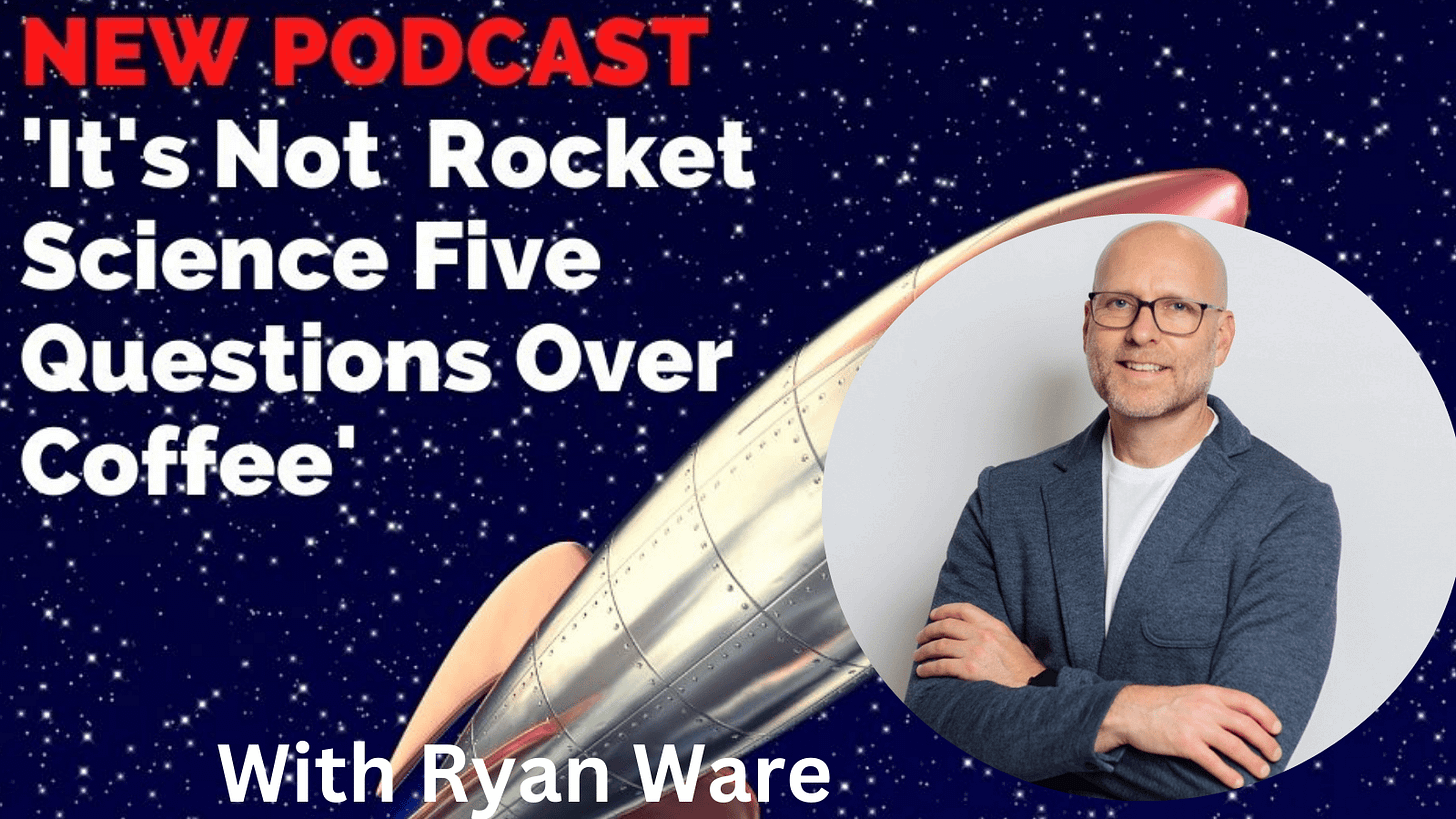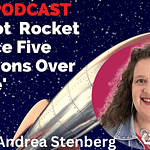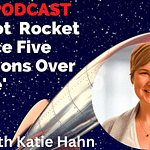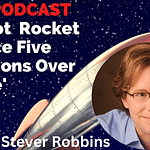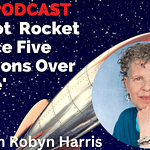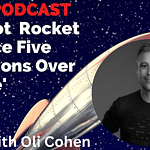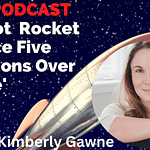Who is Ryan?
Ryan Ware is a thought leader who helps individuals and organizations navigate the challenging period of change. He identifies a common tendency among people to undervalue the transitional phase between the current state and a desired future. Ryan emphasizes the importance of embracing this uncertain and confusing middle area, recognizing it as a critical time for growth and transformation. Through his insights, Ryan empowers others to appreciate the significance of this phase, ultimately guiding them toward achieving their envisioned future.
Key Takeaways
00:00 "Navigating Change in Business"
06:11 "Embrace the Journey of Growth"
07:04 "Embracing Change is Uncomfortable"
12:27 Embracing Change Through Curiosity
16:17 Adapting to Change in Learning
18:47 "Embracing Curiosity in Coaching"
20:16 Embracing Curiosity in Problem-Solving
24:05 Reframe Change Mindset Strategies
28:34 Join Our Expert Mailing List
_________________________________________________________________________________________________
Subscribe to our newsletter and get details of when we are doing these interviews live at www.systemise.me/subscribe
Find out more about being a guest at : link.thecompleteapproach.co.uk/beaguest
Subscribe to the podcast at https://link.thecompleteapproach.co.uk/podcast
Help us get this podcast in front of as many people as possible. Leave a nice five-star review at apple podcasts : https://link.thecompleteapproach.co.uk/apple-podcasts and on YouTube : https://link.thecompleteapproach.co.uk/Itsnotrocketscienceatyt!
Here's how you can bring your business to THE next level:
If you are a business owner currently turning over £/$10K - £/$50K per month and want to grow to £/$100K - £/$500k per month download my free resource on everything you need to grow your business on a single page : https://systemise.me
It's a detailed breakdown of how you can grow your business to 7-figures in a smart and sustainable way
————————————————————————————————————————————-
Transcript
Note, this was transcribed using transcription software and may not reflect the exact words used in the podcast.
SUMMARY KEYWORDS
change management, construction industry, architectural design, business transformation, team coaching, mindset shift, curiosity in business, growth mindset, human side of change, habit formation, leadership empathy, organizational development, business strategy, process improvement, learning culture, resistance to change, business coaching, fractional COO, project management, behavioral change, employee engagement, adaptability, consulting, coaching vs consulting, discovery call, strategy session, willingness to change, Amy Edmondson, Carol Dweck, failure as learning
SPEAKERS
Ryan Ware, Stuart Webb
Stuart Webb [00:00:31]:
Hi there, and welcome back to It's Not Rocket Science, five questions over coffee. I'm delighted, well, one, to have my, coffee in front of me, which is the most important part of all of this. There's not very much left in there at the moment, so I'm gonna need to refill that soon. But, I'm also delighted to to to welcome Ryan who tells me he has decaf coffee in front of him. So, don't, don't don't fall asleep on us, Ryan. You gotta be you gotta be entertaining us for the next twenty minutes or so. Ryan is a, keynote speaker, a coach, a fractional chief operating officer, and he really helps teams within the construction, architectural design space to navigate change, to think about the way in which they have to approach the changes that are, that are that they're approaching in their business. But it's a it's a it's a common problem that all business owners have to, think about, which is how do you navigate the changes in the business landscape around you.
Stuart Webb [00:01:28]:
So, Ryan, welcome to It's Not Rocket Science, five questions over coffee. Thoroughly looking forward to this. So, please, take your time to tell us a little bit more about how you help these teams to navigate change.
Ryan Ware [00:01:41]:
Yeah. Well, thank you for having me, Stuart. I appreciate the opportunity. I'm looking forward, to the questions and the conversation, even though it's decaf, try to run off natural energy.
Stuart Webb [00:01:52]:
That seems entirely reasonable. So let's start with the first question, which is Right. Let you I've already said that you work with sort of teams in the sort of architectural construction space. But, you know, the the common problem, who what are the sort of the the sort of give me the the the sort of common, ideal client, the person that sort of really is seeking sort of help from somebody like you at the moment.
Ryan Ware [00:02:12]:
Yeah. I I think there's a couple categories, but, generally, they they find themselves pretty much all in an area where they're recognizing that current state isn't exactly what they want. And they can envision this future state that they wanna get to. But they all, in some way, form, undervalue that middle that middle area. And that middle area is where things are uncertain, things are confusing, things, are unknown, and we've never seen them. We don't recognize them. It's what we call change. They undervalue that that time.
Ryan Ware [00:02:52]:
And by undervaluing it, they each have one group will overvalue current state and stay in it, and the other group will tend to rush through, that center area and and lack, the connection of human complexity into the change that's occurring whether in their individual life within a team or an organization.
Stuart Webb [00:03:17]:
And and tell me, Brian, I mean, you you you've been doing this for a while. You you you have some experience in it. What what are the sort of things that you've seen these business owners, these people within these sort of situations try before they reach you? I know when I've come across people that are doing this, they've they've they've normally done a bunch of things that try to help, but but rarely sort of, you know, seek out an expert such as yourself, and and I don't always succeed.
Ryan Ware [00:03:44]:
Yeah. It's you know, they say 70% of all change management and companies fail to meet the objective. And so a lot of times, what I mentioned in this middle area and undervaluing it, it's they'll they'll make an attempt on a new strategy, a new process, try a new solution within a project per se. And it doesn't go exactly as planned because they've never seen it before, and then they halt. And a lot of people will give up on that that center, change, area, which which is it takes a lot of time for us to learn something new, to develop, you know, new skills. We we already have habits. If we think about just a daily routine habit of getting up in the morning when who hasn't said, like, oh, I'm sorry. I'm sort of all out of sorts.
Ryan Ware [00:04:34]:
I got out of my routine in the morning.
Stuart Webb [00:04:36]:
Yeah. Yeah.
Ryan Ware [00:04:38]:
Yeah. When you get into that center area, what I see a lot of companies doing is, again, disconnecting the human side of change. And it's the objectives there. We wanna get this software put into place or there's a merger and acquisition done or or whatever. You know, it could be large or small sort of change that's occurring, but they don't go go to the humans and have the real conversation. So they'll they'll only bring up results and sort of go there. They won't drill any deeper, into the conversation to find out the root cause. They'll, they'll overvalue that current state as being something like, hey.
Ryan Ware [00:05:21]:
I've already been doing this a long time. I know how to do it, versus sort of a beginner's mindset of how do I test this? You know? How how do I work through through this change in order to learn? And I think you come from the world of science, and I try to tell everybody's like, we treated every project sort of as a laboratory or a change internally as this free testing zone to to regain knowledge on something that we've never seen before, it doesn't mean that we aren't taking what we've already known and just eliminating it. We're actually able to sort of stack on and and and grow. And I just find people rush through this. They see the goal, and they wanna rush through it. It's like, hey. You know, as simple as, hey. I wanna lose some weight.
Ryan Ware [00:06:11]:
Well, you can't just rush through that process, but you can start to recognize each day the little wins, and, you know, you don't rush through university. You know, the beauty of that the beauty of university is you go in and you're developing your learning. And even though you wanna be on the other side of it, even though you know at the end of the clarity is to graduate, you don't know what's happening on a daily basis. You can see the courses, but you don't know for sure. But where you're really in growth is that that middle confusion, you know, unknown territory that allows you to develop, and to begin to build a stronger relationship with change because you're now recognizing it as as an opportunity and a positive, not as a disruption or a cost or or a burden, to yourself.
Stuart Webb [00:07:04]:
Yeah. And I think you've mentioned two things. And and and and, what comes across to me most resonantly is change is tough, change is hard, people's habits. I mean I often remember the sort of the exercise I was taught when I was doing some of this which is you know this is the way you like, naturally lock your fingers. But if you do it the other way, it feels wrong, and it feels unnatural, and you desperately want to get back to the way it feels right. And just that action of sort of holding it there can make you feel uncomfortable, can make you feel very, very exposed if you like. And and just having to do that behavior change or or introduce something new takes people time to sort of understand that things won't be as threatening as perhaps they feel it is when they first come across it. And and the other thing is you say is is that sometimes when you when you are in that state, when you're when you're uncomfortable and when it's when it's you you have to start to think to yourself, okay.
Stuart Webb [00:08:02]:
This might not might not be as threatening as I first thought it was, but I have to want to learn to go through this. And getting to that mindset of wanting is kind of tough for a lot of people. You know, the business owner just wants to get them through it, and they're going, I was comfortable. Why why why are you making me do stuff which you don't? I I've got enough discomfort when I go home. You know? I've got a a family that I've gotta deal with. Why make me go through this discomfort now? I just wanna come here and be comfortable and and enjoy myself. You know? This is tough.
Ryan Ware [00:08:32]:
Yeah. It it's what I call willing participants first forced compliance. Right? So this is where leaders sort of begin to get it a little off track. A lot of times, they'll they're they're up the hill, and they believe they've said it, so therefore, the change is happening. And you have a middle layer who is trying to initiate the change, and everyone has their own their own agenda and their own goals towards the bigger goal. And this is where the human the human side, having that empathy of how difficult it is as a human to change. Like, just, you know, go do something simple. Get a new haircut, which I don't have the privilege to do anymore.
Ryan Ware [00:09:13]:
But, like, go change a style. Get a new shirt. Get a new get something small. How long does it take to adjust? And and when you start to recognize that within yourself and give yourself that time, that grace of adjustment period towards something new, you you can extend that same empathy towards others on your team, whether you're all coworkers or you are the manager or you're the leader. But when you when you connect the change to to humans and our and the way our brains want to function without getting into a lot of the science, because I know a lot of your shows have been able to already start to explain that, you described habits. They're great. They're perfect. We want them because that's where we're we can speed up and and be what we consider it our most efficient.
Ryan Ware [00:10:03]:
But we really hold on to that as, again, that overvalued state versus achieving what we want to. Like, taking seeing this middle area of it's always, you know, going to be a little unclear. The goal is there, but how you get there is going to still be unclear. You you overvalue that pain of going through it or the work to go through it or the the some people look at it as like, well, what if I fail? I'll be embarrassed. And what if I'm wrong? Mhmm.
Stuart Webb [00:10:38]:
First,
Ryan Ware [00:10:38]:
you know, believing in yourself and saying, like, I value that I have the ability to get through this. And even when it's not exactly what I thought, I can reframe my thought process in that moment of I've been here somewhere near here before. I've been through these things. I have the ability and think through with the team. But if we think embarrassment is, like, the end, or or we've thought something our whole life, and now it's wrong, and and we're afraid to say it and hold on to something, there's actually more cost to that and more pain to that. But we but we've it's familiar, so we keep it.
Stuart Webb [00:11:24]:
Yeah. And learning is hard, isn't it? I mean, well, I mean, we could we could do an entire an entire twenty, thirty hours on just learning. But I mean, learning is is is hard but is often undervalued in these situations. And I and I think you're absolutely right. People too often go back to when a a learning situation was difficult for them and go, well, I just don't wanna be there. You know, we we have to find these easy ramps, these easy paths, don't we? Yeah. And I'm I'm I'm gonna sort of bring in now because I think you've got some great, some some great some great offers and things that people, which we've put into our our our free stuff vault, where Ryan just took us through. I know there are a couple of offers in there, but, people, if you you go and go and look at these immediately.
Stuart Webb [00:12:09]:
In my opinion, immediately is is is is is possibly too too strong to work. But you need to get a hold of these and have a look at what Ryan is is is is giving giving away in terms of his valuable advice. Ryan, just talk us through, sort of some of the stuff that you've been able to sort of, offer to the listeners here.
Ryan Ware [00:12:27]:
Yeah. So we've got a couple ebooks that are out there really around mindset and and, you know, also just being able to navigate change by being more curious. Like, curiosity is, like, the key to me of change, and also this this idea that it's okay to be wrong once in a while. And what I mean by that, it's not, it's not that we always wanna just stand, you know, and fight against something that that we don't truly believe in, but that you could attempt to do something, and it's it may not go exactly as you thought. But now you know. And this is that world of science, and I'm trying you know, these these areas are about reframing our our thought about our relationship with change. And there's some steps and some things that you can go into, especially in chapter three of the the change mindset that some activities that you can begin to put yourself through that will help you sort of, like, assess your own relationship. Because I don't you know, you can't drive change as an individual in the company if you're not usually a willing participant or you aren't quite sure how how you react.
Ryan Ware [00:13:44]:
How do your emotions come up when something happens, until you recognize that your relationship with change tends to be one-sided. And no relationship is strong when when it's one-sided. Right. And I would say the other thing that we're we're you know, we typically will do is a strategy session or a discovery call because there's there's no one problem. As a coach or consultant, every company is different. While there's some similarities, it's just getting to know. I've gotta get closer to the team. I've gotta get closer to the problem to to be able to assess and work with them and build a relationship because, you know, consulting is is advice.
Ryan Ware [00:14:28]:
Coaching is questions. Like, I'm trying to get to your curiosity level to help you explore. And, you know, it's, to me, like, even with the speaking, I am just trying to spark enough curiosity that makes people start to question, like, I don't know. How did I learn this? Where did I get it from? Things like that to to be willing to say, hey. I'm curious enough to to go through this, like you said, and and begin to make
Stuart Webb [00:14:58]:
I think that's a brilliant way of putting it because to to make that sort of change for you to to start that journey. I mean, it doesn't matter where you are within an organization. You have to be curious about your own beliefs, your own your own behaviors, in order to get to the stage where you go, I now need to move beyond this this behavioral pattern, which which which has which has caused me to stay where I am. Because, you know, I I said this to one organization very recently who said, well, you we're talking specifically about the fact that, you know, their their growth had stalled. And I said, well, it hasn't stalled. It's going backwards because the world is advancing. Whether you like it or not, everybody around you is moving on. And so if you're sort of staying static, it means you're losing relative to everybody else two, three, four, five percent a year.
Stuart Webb [00:15:51]:
So you have to be changing constantly. Otherwise, you are behind. You're you're losing just by the fact that you're saying, well, I'm comfortable where I am. You you you're in actual fact losing. And so having that cautious sort of, belief that you need to question is absolutely critical to that whole process. I love what you were saying.
Ryan Ware [00:16:11]:
Yeah. I think it's we we forget that we're changing from the moment we're born.
Stuart Webb [00:16:16]:
Yeah. Yeah.
Ryan Ware [00:16:17]:
Life is constantly changing, but we're all you know, I I think it is. It's important that we have we create habits because we're taught that. Like, there's there's a reason that that you have to go through routines, and you gotta get them in sort of ingrained and embedded. But where I started questioning things, you know, little things is, like, as I learned math, my parents were teaching me. Those teachers were teaching me. Everyone had learned math the same way. But when I started teaching my son, I had never seen some of the new math that was coming through. And while I could be frustrated and I and I probably did get frustrated, like, why can't I figure this out? Why can't I learn it? I started realizing that the challenges that that generation is gonna have are different than than ours, but we we've learned math the same way, or we've done things the same way as all the other generations prior.
Ryan Ware [00:17:09]:
And without questioning, like, where where did we figure this? Where did we learn this? Or, you know, why do I believe this? Without doing that exploration, like, we're we're sort of allowing like, we love choice and we love control, but we're allowing other things to control us by not questioning it. And even though it may not be different, without knowing, we're letting someone else make a choice for us.
Stuart Webb [00:17:35]:
Brian, there must have been a, book, of course, a life experience that brought you to where you are with this knowledge, with this understanding, with this with this expertise in how to help construction companies go through the sort of changes you're talking about. Where did that come from? What was the what was the origination of of that? What was the book, of course, that you you think you'd recommend others sort of think about?
Ryan Ware [00:18:01]:
Yeah. I think that I think the book that really hit home was Carol Dweck's mindset. Courtney, you know, which is a couple decades old. But the just the things that I was seeing on a daily basis of how I was practicing architecture and then and left architecture and got into construction and was really trying to get people to reevaluate how they were building. You know, I watched, like, why isn't this taken off? I started just questioning, like, you know, this has been around a hundred years. Why isn't this taken off? Like, you know, we know there's other problems, like, all of it, labor shortage, all of these things occurring. It just I needed to know, like, what was the resistance? And it Yeah. You know, we could say it's risk.
Ryan Ware [00:18:47]:
We can say all of these things, but I just needed to start to understand the human mind. So reading mindset by Carol Dweck kicked off this this area for me to start thinking about, you know, how I train people in architecture, how I learn, how I wanted to take more of a coaching approach to it, and stretching people's minds as I was going through a change and implementing, you know, process and, you know, into those conversations because I couldn't force I couldn't force them to do it. If I've forced groups to to take on what I was trying to put in front of them as as, hey. Here's a new method to construction. Try it. They that's when they go into defense. Right? And and it it didn't work, or I don't have a choice. Someone is making me do this, opposed to using more curiosity, you know, kinda driven questions while having conversations with them.
Ryan Ware [00:19:51]:
Mhmm. You're trying to get trying to get them into not just their idea, but becoming those willing participants. So, you know, whether it's, you know, the Carol Dweck's and then reading a lot of the Dan Heath books. But one of my most favorite recent books is Amy Edmondson from Harvard, which wrote The Right Kind of Wrong. And you being
Stuart Webb [00:20:15]:
Great book.
Ryan Ware [00:20:16]:
From science. Right? Like, it's a it's a beautiful area where you you go back to that curiosity and exploration where just because you didn't get the answer today with all of the work that you did, it wasn't lost because you're using that experience as, like, we just know this didn't wasn't the right answer. It doesn't mean it's a wrong end. It just means it's one step closer to the right answer Yeah. Than being able to bounce back quicker. And I think that's one of the you know, that book has allowed me to be like, we have to think differently in this industry to address our problems. We we've got to kind of stretch our mind into into more curiosity sort of building experiences that create the project like a lab that we get the freedom to be wrong once in a while to make a mistake that some would say is too costly, which we're not talking about, like, you know, the buildings collapsing. We're we're talking about just selecting a new method, selecting a new delivery model, selecting a new material finish that that addresses other areas.
Ryan Ware [00:21:26]:
So, anyway, those are probably some of the books, but I would say the the one right now is Amy Edmondson's.
Stuart Webb [00:21:32]:
And I think Amy Edmondson has a a wonderful way of looking at it from all the way over from the malicious intent to destroy you through to the, hey. I was experimenting and that's a good thing, which we all have to bear in mind. You know, the the the the occasions in in which you know, you're talking about buildings collapse. There was one that I know she's talked about a little bit, which is a hotel that that unfortunately collapsed because somebody just didn't do the calculation, but that was because they were in the wrong mindset. So you you have to put yourself in the right mindset, Damien. That's the change is all about the mindset as you've been talking about and getting the right mindset. You know? Am I here? Should I be here in the I need to question everything because this is a safety critical issue, or, hey. This is a time for experimentation to learn and develop and grow.
Ryan Ware [00:22:25]:
Yeah. Yeah. I mean, I I'm a child of, you know, the eighties and the challengers. A perfect example for me of one where information's sort of there, and sometimes we're afraid to talk about it. Sometimes we're whatever the reason. Right? And I just think that creating that safe zone is you everyone can say we're creating a safe zone of kind of that learning environment. But by by really as leaders, if you're going through a change, getting just going through questions, getting to everybody's curiosity gets them to become more willing participants. But you don't have to start it with a change per se.
Ryan Ware [00:23:06]:
You don't have to be going through a massive change to begin building a stronger relationships with change. You just have to sort of start with yourself and something you've been thinking about, something you wanted to learn, something you wanted to try, you know, anything to go into that that exploration. So
Stuart Webb [00:23:27]:
Ryan, I I I'm very aware that I've been sort of asking you questions that have sparked my curiosity, but possibly are the wrong questions for, people, who have sort of, understanding of this. And and and there must be one question that you really think at the moment I should have by now asked, and it's very, it's very foolish of me not to have asked it. So I'm just gonna ask you to tell me what that question is. What is the question that I should have asked you? And and, obviously, once you've you've posed the question, you're the expert. You're gonna have to answer it for me, which is, which is the only way that, I can I can get through doing this? So what's the question, Ryan, that I should have asked you by this stage?
Ryan Ware [00:24:05]:
Yeah. I think I'll I'll stay, I'll stay in a little bit of just kinda giving, an opportunity for the for the listeners to to test something. So it would probably be is, like, what is one thing that they could do starting right now in order to, kind of reframe their thought on relationship with change? And I would say this goes back to that change mindset ebook, which has some strategies in there. But I would just I I typically like people to just start with something in their their life that it could be small like, pick a small thing that you could just win on or something that you've known your whole life, and you haven't really questioned it. And the reason I say something like that is, as a kid, you know, for a long time, we thought, you know, something happened to a child actor, in a life commercial. Because we were told that, and we believed it, and we never validated. And your whole life, you go through these things like, hey. Something something might be true.
Ryan Ware [00:25:15]:
So my question my question for them would be is pick something in your life that you were taught and you believed pretty much your whole life, but you've always felt like, there's no way this is valid. There's no way it's exactly like this. And maybe it sounds a huge impact, but just start asking the question. Where did I learn it? Who taught it to me? Who taught it to them? Is it still valid? What situations were different? What would have to be true today in order for this to be false or even further in the truth? Just to start to stretch your mind into it's okay to ask questions. It's okay to start to wonder, like, I don't know. I don't know if this is real. I don't know if this is true. And I would pick on the construction industry and say, like, because we're taught, that's exactly how we do it, or how we design or how we set up a sheet or whatever, in a set of documents, that doesn't mean it's true.
Ryan Ware [00:26:19]:
It could be something that someone set into motion years ago and just happens to become part of the process, but it's not real. And I think you just have to be willing to start asking questions and see where you get and just just to test it. You know? Just stretch yourself a little bit into this new way of thinking opposed to sitting in this current state of, like, well, I just I think it's too hard to go through the change. I don't wanna ask the question. What if somebody thinks I'm not intelligent enough because I didn't know the answer? Or, you know, because I've been here for five years, I've been doing it. Will I look, you know, silly or embarrassed? Because, you know, you read the book Traction or anything in kinda operation systems and think through it. They'll say, like, hey. If you're not embarrassed, you haven't gone deep enough.
Ryan Ware [00:27:11]:
But I I would just say, like, it's you don't have to be embarrassed by it. It actually is this moment of, like, like, an moment. It's actually this beautiful like, I keep talking about this beautiful thing that has changed, which is that's where you're growing. That's where you're learning. It's not where you're actually being downgraded or suppressed. You're in you're in an area of this freedom to to, yeah, you know, sort of explore your, kind of a beginner's mindset again of
Stuart Webb [00:27:47]:
I love that. I love that. And I think that's a really important message as we come to the end of this because, you know, change doesn't have to be embarrassing. Change doesn't have to be, I can only do it if I'm really hanging out there. Sometimes the incremental, sometimes the small steps to help you get there can be just as effective, and it's about taking yourself from the the mindset of I just wanna be comfortable through to the curious, which actually is probably the biggest shift that you can go through. Mhmm. Ryan, what a, a lot to think about, and I'm really grateful for the fact that you you spent sort of twenty, twenty five minutes with us just sort of talking us through some of that. Thank you so much.
Stuart Webb [00:28:34]:
Listen, I I'm just gonna do a little tiny bit of self promotion at the end of this. If you would like to get onto the mailing list so that you get an email, once a week, which sort of tells you who's coming up and so that you can join the the the the the LinkedIn live to to listen to some of the real experts in this, in this sort of stuff like Ryan talking to you, go to, www.systemize.me/subscribe. It's as simple as systemize.me/subscribe. And there's a simple form. It asks you for your first name and your email address, and that's it. And you'll get an email from me that just basically sort of, sets out who's coming up, what they're gonna be talking about, and you can come on and ask questions and and talk to people like us as the knowledge that people like Ryan have got. Ryan, thank you so much for spending a few minutes with us. Really appreciate you spending that time, and and I look forward to, to spending a bit more time with looking at what you're talking about and and learning more because I think, change is gonna be, the one constant that we can all agree is never going away.
Ryan Ware [00:29:40]:
Yep. Thank you, Stuart. Appreciate it.
Stuart Webb [00:29:42]:
No problem at all. Thank you.


